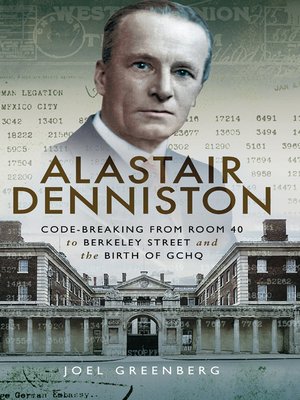Alastair Denniston
ebook ∣ Code-Breaking from Room 40 to Berkeley Street and the Birth of GCHQ
By Joel Greenberg

Sign up to save your library
With an OverDrive account, you can save your favorite libraries for at-a-glance information about availability. Find out more about OverDrive accounts.
Find this title in Libby, the library reading app by OverDrive.



Search for a digital library with this title
Title found at these libraries:
| Loading... |
"The expertly researched biography of the man who created and led the British intelligence organization best known for cracking the Nazi's codes." —Midwest Book Review
Some of the individuals who played key roles in the success of Bletchley Park in reading the secret communications of Britain's enemies during the Second World War have become well-known figures. However, the man who created and led the organization based there, from its inception in 1919 until 1942, has, surprisingly, been overlooked—until now. In 1914 Alastair Denniston, who had been teaching French and German at Osborne Royal Navy College, was one of the first recruits into the Admiralty's fledgling codebreaking section that became known as Room 40. There, a team drawn from a wide range of professions successfully decrypted intercepted German communications throughout the First World War.
After the Armistice, Room 40 was merged with the British Army's equivalent section—MI1—to form the Government Code and Cypher School (GC&CS). Initially based in London, from August 1939, GC&CS was largely located at Bletchley Park, with Alastair Denniston as its Operational Director.
With the support and assistance of both the Denniston family and GCHQ, Joel Greenberg, author of Gordon Welchman: Bletchley Park's Architect of Ultra Intelligence, has produced this absorbing story of Commander Alexander "Alastair" Guthrie Denniston OBE, CBE, CMG, RNVR, a man whose death in 1961 was ignored by major newspapers and the very British intelligence organization that was his legacy.
"An enthralling account of Alastair Denniston and his contribution to modern electronic intelligence. This book follows from his excellent biography of another great of signals intelligence, Gordon Welshman." —Fire Reviews
Some of the individuals who played key roles in the success of Bletchley Park in reading the secret communications of Britain's enemies during the Second World War have become well-known figures. However, the man who created and led the organization based there, from its inception in 1919 until 1942, has, surprisingly, been overlooked—until now. In 1914 Alastair Denniston, who had been teaching French and German at Osborne Royal Navy College, was one of the first recruits into the Admiralty's fledgling codebreaking section that became known as Room 40. There, a team drawn from a wide range of professions successfully decrypted intercepted German communications throughout the First World War.
After the Armistice, Room 40 was merged with the British Army's equivalent section—MI1—to form the Government Code and Cypher School (GC&CS). Initially based in London, from August 1939, GC&CS was largely located at Bletchley Park, with Alastair Denniston as its Operational Director.
With the support and assistance of both the Denniston family and GCHQ, Joel Greenberg, author of Gordon Welchman: Bletchley Park's Architect of Ultra Intelligence, has produced this absorbing story of Commander Alexander "Alastair" Guthrie Denniston OBE, CBE, CMG, RNVR, a man whose death in 1961 was ignored by major newspapers and the very British intelligence organization that was his legacy.
"An enthralling account of Alastair Denniston and his contribution to modern electronic intelligence. This book follows from his excellent biography of another great of signals intelligence, Gordon Welshman." —Fire Reviews






